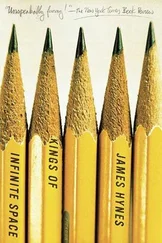Could you turn that off, please? Kevin almost says, but doesn’t, because he’s afraid of drawing the cabbie’s attention to the subject. But not to worry, the cabbie’s not listening, the cabbie’s off on another topic of his own.
“You know, a few years back?” the cabbie’s saying, speaking up over the radio and the noise of the car. “I had an idea for a book. It was when I was in rehab? This’d be eight, nine years ago, I was sitting out on the patio, you know, thinkin’. I’m a deep thinker sometimes, I just like to sit and think. Anyway, I was wondering, what if we’re all just computer programs? I mean, this goes against my beliefs — I’m a Buddhist? Since 1969?—but I was just thinkin’, what if we’re all just computer programs, and the world’s not the world, you know, just some computer programs runnin’ into each other?”
“Huh,” says Kevin. The cab muscles its way, engine straining, across three lanes of freeway traffic toward an exit. Kevin rocks in his seat and steadies himself with a hand on the window. The glass is warm to the touch.
“Then a coupla years later, that Matrix movie comes out? Before I had a chance to…”
“Yeah, you shoulda jumped on it,” Kevin sighs.
“Yeah, I reckon.” The cabbie’s narrow shoulders rise and fall. “But it’s okay. It’s not my kinda thing. I prefer your classic themes, you know, the classic struggle of good and evil. Like Blade. Or them Rings movies. You know?”
Kevin’s not really listening anymore. He’s tuned out the cabbie and the ranters on the radio, watching through the windshield for the Austin skyline, but all he sees are giant airport hotels on a bare, treeless ridge, looking gaudy and flimsy, fodder for some apocalyptic Texas tornado that will reduce them to kindling, suctioning splintered lumber and shredded drywall into the bleached sky like straw. And I want to move here, Kevin thinks, I want to put myself in the path of that biblical weather, I want to endure the blistering heat and the titanic thunderstorms. Seven months ago, in the crepuscular gloom of a Michigan November, leaving Ann Arbor had seemed like a pretty good idea. Especially after his inaugural meeting with Eileen Burks, the day she took over as the new director of the Center for Asian Studies. He knew her slightly already, as a member of the pubs committee and a rising star of the history department. He had seen her from time to time at the university rec center, where she came to run and he came to play pickup basketball two or three days a week on his lunch hour. She’d trot past him up the stairs in filmy shorts and a sports bra, sheened with sweat, and they would exchange a collegial nod. Kevin didn’t delude himself — there wasn’t a flicker of electricity between them, and anyway, he’d assumed she was gay — but even so, in the middle of his game, lifting his eyes from the slap and screech of the court to the running track above, he’d steal a glimpse of her at full throttle and admire her long-legged stride and the glide of muscles in her back.
Now she was his boss, and Kevin looked forward to a working relationship unpoisoned by testosterone. Male academics were as hierarchical as dogs, sniffing the assholes above them and snarling at the lesser mutts, and a mere staffer like Kevin was expected to roll over and bare his belly to anyone with a graduate degree. This unavoidable humiliation was compounded by the awkward fact that Kevin was the same age as or even, in recent years, older than most of the men he had worked for. A couple of the younger ones had even shown a moment of uncertainty — but only a moment, because arrogance and ambition always trump age and experience — when they realized that Kevin had been editing monographs for the center while they were still in high school. For his part, meetings like this made Kevin sympathize with Hillary Clinton, or even John McCain, at the spectacle of a seasoned veteran losing out to some jug-eared upstart.
But Eileen Burks was not that much younger than Kevin, and he knew from working with her on the pubs committee that she was brisk and straightforward. He also knew that she was more feared than respected, especially by the male junior faculty, who secretly considered her gender an unfair competitive advantage. And her grad students, a couple of whom had worked for Kevin as freelance copy editors, told him she was notorious for blowing off her office hours and taking her own sweet time reviewing dissertation chapters. Eileen Shirks, they called her.
Still, she’d always been pleasant enough to him, and coming into the director’s office for their first meeting after her appointment, Kevin had helped himself to a seat before she’d offered him one. Thus he found himself sitting while she was still standing behind her desk, sorting through carpet swatches. After a moment Kevin made as if to stand again, but she cocked an eyebrow at him and said, “No, stay,” like she would to a dog.
She continued to stand and sort through swatches while he delivered his little State of the Pubs Program address, complete with a spreadsheet printed out that morning from Excel. She scowled at the carpet samples the entire time he was talking, and when he offered her the spreadsheet she lifted her sharp chin toward a corner of the desk. He lay the folder gingerly on the desktop. The only sound he heard was a thin whine, which was all the good will and high hopes he’d brought into the office escaping into the air at a pitch that only he could hear. He also had the sinking feeling that the new carpet she was busy selecting was going to be paid for, at least in part, out of the publications budget.
“I’ve seen you at the gym,” she said, still standing.
“Yes.” Kevin brightened — she remembers me!
“I assume that’s your lunch hour?” Still she wouldn’t meet his eye, but instead glanced from a wine-red swatch in her left hand to a blue one in her right.
“Yeah,” he said casually. “I play a pickup game with some guys two, three days a week.”
“So,” she said, laying down the blue swatch and picking up a bluer one, “the game itself lasts, what, forty-five minutes?”
“Maybe a little less.” Uh oh.
“So by time you walk over there, change your clothes, warm up, play the game, shower—”
And sauna, thought Kevin, but he knew better than to say so.
“—and walk back to your office, that’s what? An hour and a quarter? An hour and a half?” Still she wasn’t looking at him.
“Come on, Eileen,” Kevin said, collegially. “I see you at the gym all the time.”
“I’m not on the clock.” She let both swatches fall from her hands in disgust, and then said, with icy politesse, “May I call you Kevin?”
“Of course.” He could feel himself dwindling in the chair.
“Kevin.” Eileen fixed him with glacially blue eyes. “You’re not salaried like I’m salaried.”
His feet dangled above the carpet, his head shrank into his collar.
“Do we understand each other?” Eileen said.
“Perfectly,” said Kevin, the Incredible Shrinking Man.
The meeting was over. “I’ll look over your budget,” she said as he walked, vibrating with rage, across the crummy old carpet to the door, “and we’ll have a talk about it, soon.” On his way through the outer office, he heard her call for the center’s administrative associate.
“Mira!” cried Eileen. “Call Building Services. These can’t really be the only swatches they have. These are just unacceptable. ”
Two minutes later, in his own office up under the eaves of Willoughby Hall, Kevin had dropped into his chair, slapped the latest issue of Publishers Weekly onto his desk, and begun to pore through the job postings at the back of the magazine. His PW subscription was like his long basketball lunches, a little perk he allowed himself on the Center’s nickel, buried deep in a sub-sub-basement of Excel. The bitch slap he’d just received from Eileen wasn’t the worst humiliation he’d ever endured from an employer — the manager at Big Star had called him “adolescent” to his face, and the speedfreak manager at Central Café had fired him for being too slow — but as he began to limn likely jobs with an orange highlighter, he decided that it was going to be the last humiliation. And it wasn’t just petulance or wounded pride, he told himself. The state of Michigan was dying all around him, leading the nation in unemployment and mortgage foreclosures. The auto industry was in its last throes, Detroit itself slowly reverting to nature, Flint was such a wasteland no one but Michael Moore went there anymore. Five years ago, Kevin would have said that his own job was as secure as you could get without actually having tenure — the academics he worked for loved the idea of having their own little publishing unit — but now the legislature was cutting the money for higher education year after year, and the U itself was trimming budget lines in every department. Even his profession didn’t look so secure anymore: young academics still needed to publish or perish, but now they could distribute their monographs worldwide instantly, and pubs programs like Kevin’s were beginning to look as quaint as floppy discs or newspapers.
Читать дальше












